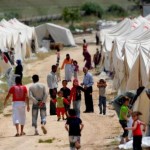One of the most fervently debated topics in International Relations is over whether or not economic interdependence decreases the likelihood of war. Intuitively, it seems obvious that two countries whose economies are entwined would have greater incentives to avoid violent conflict. Critics assert, however, that since two countries are never equally dependent on each other, the relative power distribution between them is the primary influencer of peace or conflict. Moreover, since trade increases the number of interactions between the two parties, it gives the two states more to fight over.
Recently, John Mueller, a political scientist at Ohio State University, argued that Russia’s annexation of Crimea is evidence that the critical position is correct: economic interdependence may actually increase the potential for war. Since Putin’s intervention in Crimea was not constrained by consideration of the potential economic costs of doing so, interdependence has failed to incentivize peace.
There are two important problems with Mueller’s argument. First, there is the question as to whether Russia and Ukraine are interdependent. Interdependence is defined as ties that are mutually costly to break (for example, see Robert Keohane and Joseph Nye Power and Interdependence 2001). In 2012 total trade with Russia (imports and exports) accounted for 26% of Ukraine’s economic activities, whereas this trade accounted for only 2% of Russia’s GDP. Problematically, the commercial peace literature has not established guidelines as to what level economic activity is necessary for a “costly tie” to exist. While, 2% is not insignificant it does not seem to indicate a very high cost for Russia. Additionally, it is unlikely that the Ukraine can even cut off trade with Russia because the Ukraine is itself so heavily dependent on it. This latter fact does hint at problems for the theory, however, in cases of extreme asymmetrical interdependence.
Second, it is not clear how costly Russia’s intervention in the Ukraine will ultimately be. Russia’s economy has slowed and capital is flowing out of the country due to concerns over regional instability, but for the present Russia has not faced severe economic penalties. This is most likely because Russia’s actions simply do not threaten the security or strategic interest of the major powers in the EU or of the US. It would be quite a different story, of course, were Russia to directly threaten NATO member nations. Moreover, Putin has seen his popularity in Russia increase significantly. The minor economic losses that Russia has suffered as a consequence have been more than offset by nationalist sentiment within the country. This fact does not provide evidence against economic interdependence. Only if Russia were to suffer substantial economic consequences would we expect Putin’s actions to be significantly altered.
So what does this bode for the future? The two parties that do seem economically interdependent in this case are that of Russia and the EU. Thus, we can say that the commercial peace has failed in this instance if Russia were to militarily intervene in any country that might directly threaten EU strategic interests. For if Russia did so, it is nearly certain that widespread sanctions threatening Russia’s oil and natural gas industry would go into effect, and such provocations could even lead to a wider war. In practical terms this means that Russia should not act against any member of NATO.
Interdependence, however, is not the only influence when it comes to aggressive interstate actions. Jeff Colgan, a professor at American University, recently why Russia’s oil revenues might make war more likely. Colgan explains that large oil revenues can increase the likelihood of conflict initiation by providing an independent means of political survival. In simpler terms, as long as Russia’s oil and gas revenues do not drop off significantly, Putin has a solid base of political support that will not abandon him if other sectors of the economy contract. Practically speaking, this implies that the only sanctions that matter are ones targeting Russia’s energy sector. Until that point, Putin will enjoy considerable domestic support for Russia’s aggressive actions.
Interdependence, however, is not the only influence when it comes to aggressive interstate actions. Jeff Colgan, a professor at American University, recently stated why Russia’s oil revenues might make war more likely. Colgan explains that large oil revenues can increase the likelihood of conflict initiation by providing an independent means of political survival. In simpler terms, as long as Russia’s oil and gas revenues do not drop off significantly, Putin has a solid base of political support that will not abandon him if other sectors of the economy contract. Practically speaking, this implies that the only sanctions that matter are ones targeting Russia’s energy sector. Until that point, Putin will enjoy considerable domestic support for Russia’s aggressive actions.
While no longer a major player on the world stage, it seems Russia is once again making peace in Europe less certain.
More articles in the categories Economy, Europe, NATO
Also by Anita
Have Non-Military Options Been Exhausted In Syria?
A key argument for military intervention in Syria rests on the assumption that all non-violent options have been exhausted. The UK government made this very claim in a document intended to provide a legal justification for war ahead of Parliament’s vote on the issue.




Trackbacks / Pings